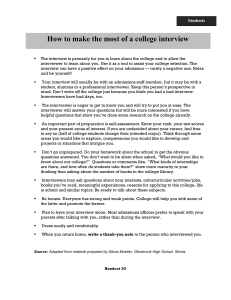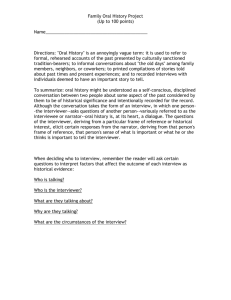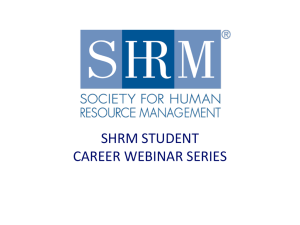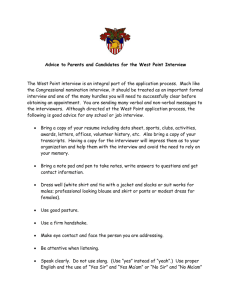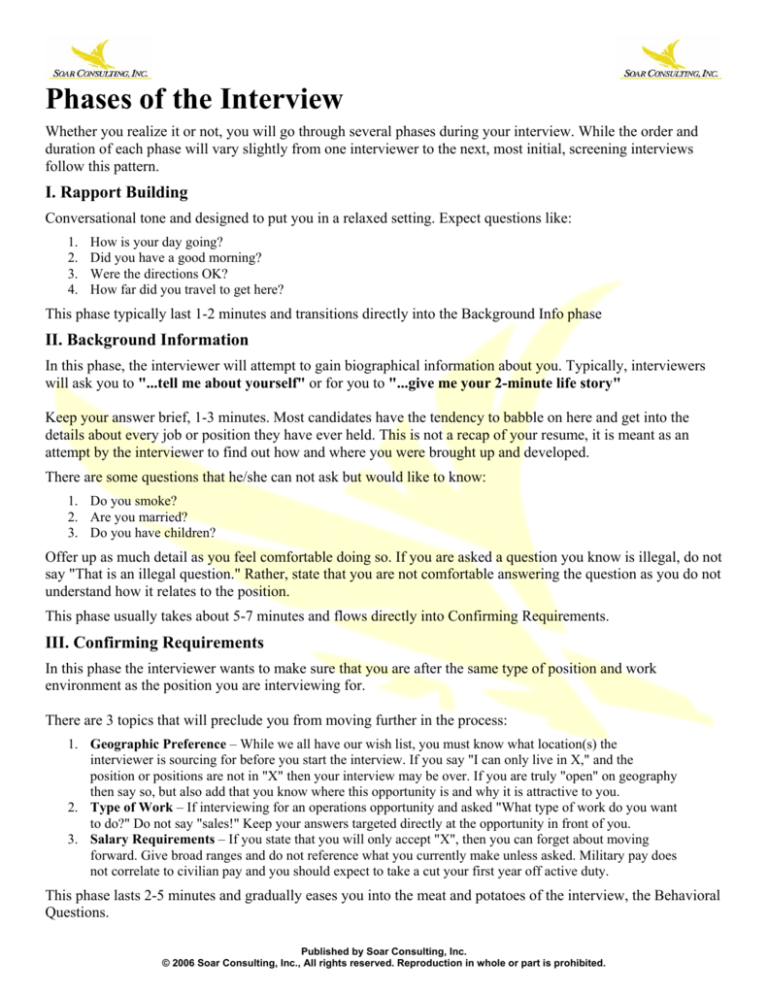
Phases of the Interview
Whether you realize it or not, you will go through several phases during your interview. While the order and
duration of each phase will vary slightly from one interviewer to the next, most initial, screening interviews
follow this pattern.
I. Rapport Building
Conversational tone and designed to put you in a relaxed setting. Expect questions like:
1.
2.
3.
4.
How is your day going?
Did you have a good morning?
Were the directions OK?
How far did you travel to get here?
This phase typically last 1-2 minutes and transitions directly into the Background Info phase
II. Background Information
In this phase, the interviewer will attempt to gain biographical information about you. Typically, interviewers
will ask you to "...tell me about yourself" or for you to "...give me your 2-minute life story"
Keep your answer brief, 1-3 minutes. Most candidates have the tendency to babble on here and get into the
details about every job or position they have ever held. This is not a recap of your resume, it is meant as an
attempt by the interviewer to find out how and where you were brought up and developed.
There are some questions that he/she can not ask but would like to know:
1. Do you smoke?
2. Are you married?
3. Do you have children?
Offer up as much detail as you feel comfortable doing so. If you are asked a question you know is illegal, do not
say "That is an illegal question." Rather, state that you are not comfortable answering the question as you do not
understand how it relates to the position.
This phase usually takes about 5-7 minutes and flows directly into Confirming Requirements.
III. Confirming Requirements
In this phase the interviewer wants to make sure that you are after the same type of position and work
environment as the position you are interviewing for.
There are 3 topics that will preclude you from moving further in the process:
1. Geographic Preference – While we all have our wish list, you must know what location(s) the
interviewer is sourcing for before you start the interview. If you say "I can only live in X," and the
position or positions are not in "X" then your interview may be over. If you are truly "open" on geography
then say so, but also add that you know where this opportunity is and why it is attractive to you.
2. Type of Work – If interviewing for an operations opportunity and asked "What type of work do you want
to do?" Do not say "sales!" Keep your answers targeted directly at the opportunity in front of you.
3. Salary Requirements – If you state that you will only accept "X", then you can forget about moving
forward. Give broad ranges and do not reference what you currently make unless asked. Military pay does
not correlate to civilian pay and you should expect to take a cut your first year off active duty.
This phase lasts 2-5 minutes and gradually eases you into the meat and potatoes of the interview, the Behavioral
Questions.
Published by Soar Consulting, Inc.
© 2006 Soar Consulting, Inc., All rights reserved. Reproduction in whole or part is prohibited.
IV. Behavioral Questions
Here your interviewer will seek to determine a pattern of past behaviors to predict future performance.
Employers hire on behavior patterns and teach the specific skills required for the job. In the next section, we
will learn how to answer behavioral questions using the SOAR method. You can expect this phase of the
interview to last anywhere from 10 – 30 minutes.
V. Questions for the Interviewer
You know the interview is winding down when the interviewer asks "What questions do you have for me?" or
something similar. This tells you that he/she is finished evaluating you and is ready to entertain your questions
about the company and/or position.
1. Have 3 – 5 questions written out specific to the opportunity. Do your research ahead of time and have
your questions ready. It is OK, and even demonstrates your focus, to refer to your notes when asking
questions.
2. Questions should focus on opportunity, growth, and development, NOT training. You are being
brought on to make an immediate impact. If you focus too much on what your training will involve, the
interviewer will get the impression that you will need your hand held.
3. Use the "assumptive" position when phrasing questions. By assuming that you are already on the
team, you are demonstrating to the interviewer that you do not waste time and that you are already
focused on increasing sales, improving profits, and driving customer satisfaction.
What to Avoid when asking questions:
1. What's in it for me? Do not ask about benefits, salary, relocation, etc. When the time is right, the
interviewer will bring it up – usually near the end of the interview process.
2. Questions that were covered in the interview or that can be answered with basic internet research
3. Questions on who the major competitors are, what the company's stock performance has been, or about
what the products and services offered are. You should already know!
Sample Questions to the Interviewer:
•
•
•
•
•
•
•
•
•
•
•
•
•
•
•
To whom would I report to and where does this fit in to the organizational structure?
What are the 3 most common traits of successful people currently in this position?
How will my performance be evaluated?
How many people will I be leading?
What are the company's three biggest strategic initiatives for this fiscal year?
How will we increase market share while maintaining a high level of customer service?
Tell me about the most successful person you know in the company that is in this type of position and
why you think they are successful in the role.
What are some of the traits that would make someone a good candidate for this position?
What are the three most important things you are looking for as you evaluate candidates for this position?
What would a new hire need to do to exceed your expectations?
What opportunities do you see in our marketplace over the next few years?
What challenges do you see in our marketplace over the next few years?
Who are the internal and external customers I would be serving? How would I interact with these
customers and how could I exceed their expectations?
What are some of the new areas of technology being explored? How do you think this will affect the
business in the future?
What are some barriers I could face in this position and how could I best address them?
Your last question should always be a closing question. The next section covers different types of closing
questions and why they are important.
Published by Soar Consulting, Inc.
© 2006 Soar Consulting, Inc., All rights reserved. Reproduction in whole or part is prohibited.
Answering Behavioral Questions
Candidates that do not practice do not win interviews. There is a method to answering interview questions that
you should follow, but it takes practice! Answers to Behavioral Questions should follow the SOAR method.
This method will help you deliver the type of answers that interviewers are taught to extract.
The method is centered on you providing real world examples of your past behavior. Remember, past
performance is the best indicator of future behavior. Behavioral patterns are what interviewers are attempting to
determine. So, the more specific, relative examples you can give the better off you are.
Think of specific examples as telling a story to demonstrate a point. The SOAR process is an easy way to
remember to give specific examples (stories) that give evidence to your behavioral traits.
S
Situation
O Objective
A
Action
R
Result
Briefly describes the background information necessary to relay your specific
example
"For example..."
"Just last month..."
Tells the corrective action to change the behavior, practice, or process
"My challenge was to..."
"I had a huge task in that..."
Relays the steps that were implemented
"I initiated/changed/reduced/etc..."
Describes the positive outcome
"As a result, ..."
"At the end of the day/exercise/mission..."
15 - 20
Seconds
15 – 30
Seconds
1–2
Minutes
10 – 20
Seconds
Additional Notes on Answering Interview Questions
1.
2.
3.
4.
5.
6.
When answering problem-solving questions you must address the thought process involved in dealing with the issue
as well as the solution you would put into place to avoid future issues of a similar nature. Identify the problem,
consider constraints and limitations, seek out constructive guidance/criticism, and build consensus/create ownership
and support on your team through implementing others ideas/plans.
When you talk about giving directives, coaching people, and putting plans into motion it is important to qualify and
quantify what you mean. Many people in Corporate America perceive military leaders to be more authoritative than
we really are. It's important to sound tough but also fair and reasonable, but above all else flexible. Good leaders are
ultimately able to adapt their leadership style to the situation they are in and the skills and abilities of their team. In
your examples, talk about how you gave specific guidance, set expectations and realistic timetables, played to
people's strengths, coached them on their weaknesses, put contingency plans in place and benchmarks to follow-up
with you, and built in natural flexibility.
Show that each solution or process that you create corrects root causes of problems and is not a Band-Aid approach.
This has real value when you can talk about systems or processes you put into place that were adopted by larger
parent organizations as "best practices."
Never be negative about a boss, a co-worker, another candidate, or the military. People who talk negatively in the
interview process are typically perceived to be disgruntled and hard to please. Always put any negative answers or
comments you consider making in the context of how you would consider somebody saying the same thing to you if
you were interviewing.
Know your audience and tailor your answers to the person and the position you are looking for.
If all else fails, remember to tell stories!
Published by Soar Consulting, Inc.
© 2006 Soar Consulting, Inc., All rights reserved. Reproduction in whole or part is prohibited.
Closing Questions & Methods
No matter how you think the interview went, you must always ask for the job! This is true for interviews for all
types of positions: sales, operations, technical, etc. Interviewers think that your interest level is low if you do
not tell them you want the opportunity!
Different Methods of Closing the Interviewer
1. Isolation: In this method you attempt to get any potential objection out in the open to address them right
away. Assuming there will be none, you then move in for the close.
"Is there anything we covered today that would prevent me from moving forward in the interview
process?"
"Great! I would love to meet the rest of the team, when can we schedule our next meeting?"
2. Set Up: Here you try to align your skills and behavior traits with the ones the interviewer deems most
important. Once that is done you push for the close.
"What are the most common character traits of your top performers?"
"Do you think that I have demonstrated my ability in those aspects today?"
"Awesome, when can I expect the next interview to take place and whom will I be meeting with?"
3. Assumptive: This takes assurance that the interview went extremely well. Typically used in sales
interviews, it demonstrates your confidence and shows your mastery of using the assumptive close.
"Thank you so much for your time today. I think we had a great meeting and I am already looking
forward to making an impact on your team. Should we schedule the next interview for later this week?"
4. Subtle: Most people end an interview with "What is the next step?" This is not a close but a procedural
inquiry. Spice it up just a bit and it becomes a close.
"What is the next step in the interview process I can expect and when would you anticipate that
occurring?"
OR
"I understand the next step is typically a plant tour, will I be afforded that opportunity?"
5. Direct: Puts the interviewer on the spot by asking if he or she perceives a fit.
"I am extremely excited about this opportunity. Do you think that I am someone that would be a good fit
for your team?"
OR
"Do you think that I am a match for the opportunity?"
Common Mistakes
This list represents the most common reasons we hear form companies for NOT pursuing a candidate
1.
2.
3.
4.
5.
6.
7.
8.
9.
10.
No Specific Examples – Unable to demonstrate previous behaviors, leadership
Lack of Enthusiasm – Interest in opportunity not relayed, no smile
Lack of Interest in Industry – Downplay opportunity vs. others, poor research on industry
Poor Communication Skills – Eye contact, mumbling, fidgeting, "ums" & "ahs"
Poor Impact Presence – Attire, neatness not in tune with culture, unshaven, hair-cut
Career Plan – Lack of one or unrealistic, no clear goals
Lack of Company Research – Little or no preparation
Geographic Limitations – Unwilling to relocate
What's in it for me? - Too much focus on salary and benefits too early in the process
No Follow Up – You should send a Thank You note or email immediately after each interview
Published by Soar Consulting, Inc.
© 2006 Soar Consulting, Inc., All rights reserved. Reproduction in whole or part is prohibited.


